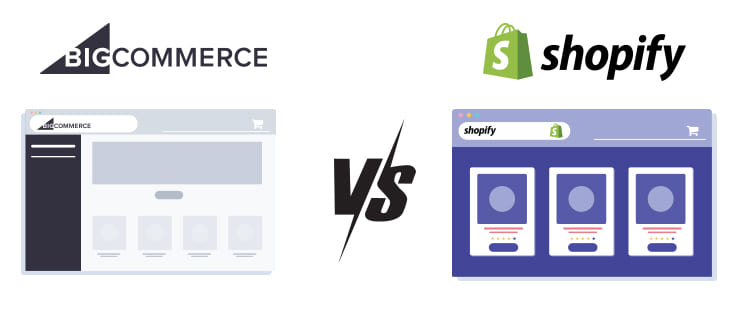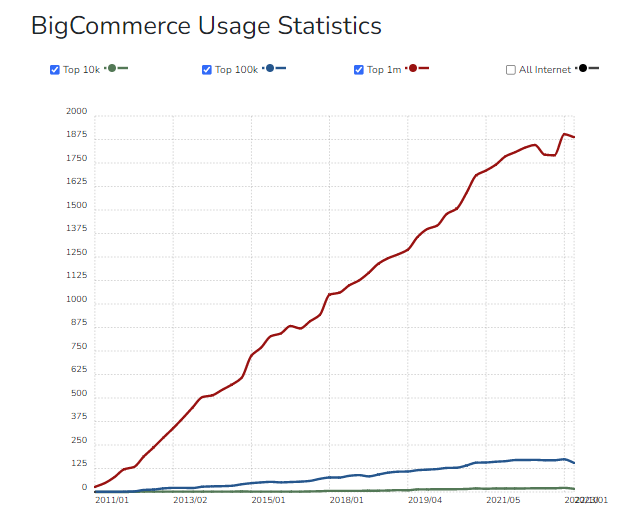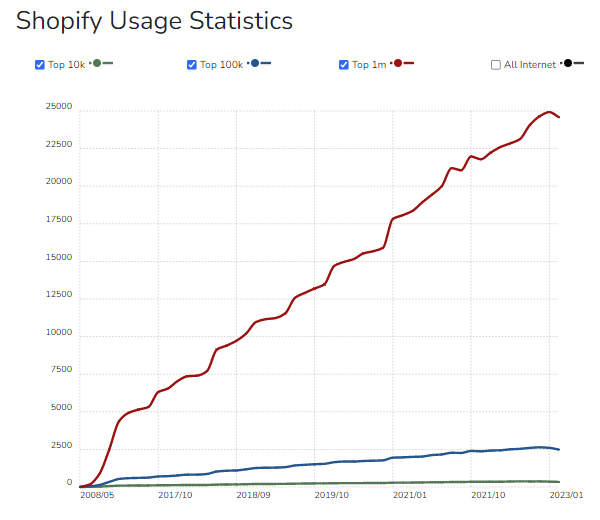
Selecting the best e-commerce platform for your business is critical to ensure that your online store has the right functionality, customization options, scalability, user-friendliness, integration capabilities, security, support, and cost structure that align with your business requirements and goals. A well-chosen e-commerce platform can contribute significantly to the success of your online store and help you provide a seamless shopping experience for your customers.
In this article we’ll cover:
- What is BigCommerce?
- What is Shopify?
- BigCommerce vs Shopify
- Which Platform Is Right for You?
- Key Takeaways
- FAQs on BigCommerce vs. Shopify
What is BigCommerce?
BigCommerce is an e-commerce platform that provides the necessary features to build, manage, and grow your online business. It provides a wide range of tools for building and customizing online stores, managing inventory, processing payments, and facilitating online sales. This platform is known for its flexibility and scalability, making it suitable for small businesses as well as large enterprises.
Overall, BigCommerce provides businesses with a comprehensive set of features and benefits that make it a powerful and flexible e-commerce platform for creating and managing online stores.
What is Shopify?
Shopify is a leading cloud-based e-commerce platform that enables businesses to create and manage online stores. It provides a range of tools and features for building, customizing, and marketing e-commerce websites. Shopify is known for its scalability, allowing businesses to start small and grow their online stores as their needs evolve.
The features like designing the storefront to processing payments and managing orders makes Shopify a popular choice for businesses of all sizes, from small startups to large businesses. To get started with Shopify, check out our Shopify Development Services.
BigCommerce vs Shopify
| BigCommerce | Shopify | |
| Ease Of Use | 3.3 | 3.5 |
| Customization | 4 | 4 |
| Tools Connectivity | 4.1 | 4.3 |
| Features And Functionality | 3.6 | 4.2 |
| Support And Resources | 3.1 | 4.6 |
| Overall | 4.1 | 4.6 |
BigCommerce and Shopify are two popular e-commerce platforms that can help you run an online business. Both BigCommerce and Shopify offer a wide range of features, but there are some key differences between the two that could make one better suited for your needs than the other.
Let’s take a look at Shopify vs BigCommerce and compare the two platforms to help you determine which one is right for your business.
Pricing Plans
The pricing plans of both BigCommerce and Shopify are as under –
Shopify:
- Basic Shopify: $29 per month
- Shopify: $79 per month
- Advanced Shopify: $299 per month
- Shopify Plus: Custom pricing (for enterprise-level businesses)
The pricing plans are tiered, with increasing features and functionality at higher price points. In addition to the monthly subscription fees, Shopify also charges transaction fees on sales made through external payment gateways, unless merchants use Shopify Payments as their payment gateway.
BigCommerce:
- Standard: $29.95 per month
- Plus: $79.95 per month
- Pro: $299.95 per month
- Enterprise: Custom pricing (for high-volume businesses)
The pricing plans of bigCommerce are tiered, with increasing features and functionality at higher price points. The Enterprise plan is available for custom pricing and is suitable for larger businesses with more complex requirements. BigCommerce does not charge transaction fees on sales made through external payment gateways.
It’s important to note that these prices are for the base plans, and both Shopify and BigCommerce offer additional features and functionality through add-ons or apps that may come with additional costs. Additionally, transaction fees may apply depending on the payment gateway you choose, and other factors such as website hosting, domain registration, and SSL certificates may also impact the overall cost.
Ease of Use
Shopify is known for its user-friendly interface and intuitive design, making it easy for e-commerce store owners to set up and manage their online stores. This platform offers a straightforward setup process, with a user-friendly dashboard that provides easy access to all key features and settings. Shopify also offers a drag-and-drop website builder, which allows merchants to easily customize their store’s design. Additionally, Shopify offers a large library of documentation and resources, including tutorials, guides, and a supportive community, to help merchants get started and navigate the platform.
BigCommerce has a steeper learning curve compared to Shopify for some merchants. While BigCommerce offers a similar dashboard-style interface, it may have more advanced features and settings that require some technical understanding. Bigcommerce’s drag-and-drop builder surpasses Shopify in terms of design and flexibility. BigCommerce also provides comprehensive tutorials, and a supportive community to assist merchants in setting up and managing their e-commerce store.
However, Shopify is often considered more beginner-friendly and may be easier to use for merchants with little to no technical experience.
Templates
Shopify offers a wide range of professionally designed templates, with both free and paid options available in their theme store. These templates cover various industries and design styles, including responsive designs that are optimized for mobile devices. Shopify themes are known for their high-quality, modern designs and user-friendly customization options. Merchants can easily customize the templates using Shopify’s built-in theme editor, which allows for changes in colors, fonts, images, and more.
BigCommerce also offers a variety of templates, with both free and paid options available in their theme store. These templates are designed to be responsive and mobile-friendly, providing a seamless experience across different devices. BigCommerce themes are known for their clean and professional designs, with customization options available through BigCommerce’s built-in theme editor. Merchants can make changes to colors, fonts, images, and other visual elements without needing to write code.
Customization
Shopify offers numerous customization options, including a robust theme store with free and paid themes, which can be further customized using Shopify’s built-in theme editor. Merchants can also create custom CSS and HTML codes to modify the design and appearance of their online store. Shopify also provides a powerful “Liquid templating language” that allows for advanced customization and flexibility in creating unique layouts and functionalities. Additionally, Shopify offers an extensive app store with thousands of apps that provide additional customization options for your online store, such as product options, checkout processes, and more.
BigCommerce also offers a variety of customization options, including a theme store with free and paid themes that can be customized using BigCommerce’s built-in theme editor. Merchants can also modify the design and appearance of their online store by editing the HTML, CSS, and JavaScript code. BigCommerce provides a “Stencil templating engine” that allows for advanced customization and flexibility in creating unique layouts and functionalities. Additionally, BigCommerce offers an app marketplace with a wide range of apps that provide additional customization options for various aspects of an online store.
SEO Features
Shopify offers a variety of built-in SEO features and third-party apps, including customizable meta tags, URL structure, title tags, and alt tags for images. Shopify also provides automatic generation of sitemaps and robots.txt files to help search engines crawl and index your online store. Additionally, Shopify allows for customizing header tags (H1, H2, H3, etc.), supports canonical tags, and offers 301 redirects to help with URL redirects and management. Shopify also has a wide range of SEO apps available in its app store that can further enhance the SEO capabilities of the platform.
BigCommerce also offers SEO features, including customizable meta tags, URL structure, title tags, and alt tags for images. BigCommerce supports customizing header tags, canonical tags, and offers 301 redirects for URL management. BigCommerce also offers an SEO-friendly URL structure by default, which can help with SEO efforts. Similar to Shopify, BigCommerce also has a variety of SEO apps available in its app marketplace for additional SEO functionalities.
While Bigcommerce has better SEO features, Shopify offers access to numerous third-party apps to incorporate SEO. Both platforms let you integrate Google Analytics for in-depth reports. It’s important to note that SEO is an ongoing process that requires ongoing efforts and best practices beyond just the built-in features of the platform. Merchants need to consistently optimize their content, meta tags, URL structure, and other SEO elements to improve their SERP rankings. To build white-hat links for your website using SEO, get started with our organic SEO services today.

Looking to build or upgrade your E-commerce Store?
Provide superior experience to your website vistitors with Zestard’s E-commerce development services.
Scalability
Shopify can handle small to large-sized businesses with ease. Shopify offers a range of pricing plans, including Shopify Lite for small businesses, Shopify Basic for emerging businesses, Shopify, Advanced Shopify, and Shopify Plus for high-volume merchants. These plans come with different features and capabilities, allowing merchants to choose a plan that aligns with their business size and needs. Shopify Plus, in particular, is designed for enterprise-level businesses and offers advanced features for high-volume sales, customizations, and integrations. Although, it becomes difficult to shift to other plans once you have selected one plan on Shopify.
BigCommerce is known for its scalability and can accommodate small to large-sized businesses. BigCommerce offers a range of pricing plans, including Standard, Plus, Pro, and Enterprise, which cater to businesses of different sizes and requirements. The plans come with varying features and capabilities, with BigCommerce Enterprise offering advanced functionalities for high-volume sales, customizations, and integrations. BigCommerce also offers additional services, such as custom pricing and tailored solutions, to meet the specific needs of larger businesses.
Community
Shopify has a large and active community of users, developers, and partners. The Shopify Community Forum is a popular hub for merchants to connect, ask questions, and seek advice. Shopify also hosts an annual event called Shopify Unite, which brings together developers, partners, and merchants for networking and learning opportunities. Additionally, Shopify has an extensive network of partners, including designers, developers, and marketers, who can provide services and support to merchants.
BigCommerce also has a growing community of users, developers, and partners. The BigCommerce Community Forum is a place for merchants to ask questions, share knowledge, and seek guidance. BigCommerce also hosts an annual event called the BigCommerce Partner Summit, which brings together partners, developers, and merchants for networking opportunities.
Integrations
Shopify has an app store called the Shopify App Store, which offers thousands of apps that can be easily integrated with your online store. These apps cover various functionalities such as payment gateways, shipping, inventory management, marketing, analytics, customer support, and more. Many popular and widely-used apps, such as PayPal, Google Analytics, Mailchimp, and Facebook, have dedicated integrations with Shopify. Additionally, Shopify has a well-documented API that allows developers to create custom integrations and extend the platform’s capabilities.
BigCommerce also offers a wide range of integrations through its app marketplace called the BigCommerce App Marketplace. Similar to Shopify, these apps cover various functionalities such as payment gateways, shipping, inventory management, marketing, analytics, and more. BigCommerce lets you easily integrate with popular apps like QuickBooks, Xero, TaxJar, and many others.
Where Shopify is better for large stores, BigCommerce integrations are better for running an online business.
Software Updates Frequency
As a platform, Shopify provides regular software updates to its users. These updates are typically rolled out automatically to all merchants on the platform, and merchants do not have to manually update their stores. Shopify follows a continuous deployment model, which means that updates are pushed to the platform as soon as they are ready, without a fixed schedule. This allows merchants to benefit from new features and bug fixes as soon as they are released.
Unlike Shopify, BigCommerce follows a release schedule with planned updates that are typically rolled out on a quarterly basis. These updates are announced in advance, and merchants have the option to schedule the update for their store or have it applied automatically. This means that merchants can plan for updates and ensure that their store is always running on the latest version of the software.
Continuous deployment allows merchants to benefit from new features and bug fixes more quickly, but it may also require more attention to ensure compatibility with customizations or integrations. On the other hand, a quarterly release schedule allows merchants to plan for updates but may result in a longer time between feature releases.
Market share
Shopify is widely recognized as the leader in the e-commerce platform market, with a significant market share. Shopify holds a substantial market share of around 26.2% among the top 1 million websites worldwide that use e-commerce platforms.
On the other hand, BigCommerce has a smaller market share, estimated to be around 2.07% among the top 1 million websites. BigCommerce, while also a popular platform, tends to cater more to mid-sized to enterprise-level businesses, with a focus on providing advanced customization options, scalability, and many e-commerce features.
Customer Support
Shopify offers 24/7 customer support through multiple channels, including live chat, email, and phone. Shopify also provides a dedicated support team for their Plus (enterprise-level) customers, offering priority support and faster response times. Additionally, Shopify has an active community forum that can provide help and support through discussions.
BigCommerce also offers customer support through multiple channels, including live chat, email, and phone. BigCommerce provides a dedicated support team for their Enterprise customers, offering personalized support and priority access to new features. BigCommerce also has an active community forum and a community-driven “BigCommerce Community” platform where users can ask questions, share knowledge, and seek help from other BigCommerce users.
However, Shopify’s customer support is known for its responsiveness and availability, with 24/7 support across all plans, including a dedicated support team for Plus customers. BigCommerce also offers comprehensive support, including a dedicated team for Enterprise customers, but its response times and availability may vary depending on the plan and level of service.
Security
Shopify is known for its robust security features. It provides SSL encryption for all online stores, which helps protect customer data and transactions. Shopify also offers a Level 1 PCI DSS (Payment Card Industry Data Security Standard) compliant hosting environment, which ensures that sensitive credit card information is securely processed and stored. Additionally, Shopify regularly updates its software to address security vulnerabilities and offers features such as fraud detection, two-factor authentication, and automated backups.
BigCommerce also offers advanced security features, including SSL encryption, PCI DSS compliance, and regular software updates to address security vulnerabilities. BigCommerce also provides security measures like DDOS protection, web application firewalls, and malware scanning to further enhance the security of online stores. This platform also offers a dedicated SSL certificate for checkout pages to enhance customer trust and security during the checkout process.
Which Platform Is Right for You?
Choosing the right e-commerce platform for your business depends on various factors, including your business requirements, budget, technical expertise, scalability needs, design preferences, and more. Both Shopify and BigCommerce are reputable e-commerce platforms with their strengths and weaknesses.
It’s important to carefully evaluate and compare the features, pricing, ease of use, customization options, SEO features, scalability, community support, and integrations of both Shopify and BigCommerce to determine which one aligns best with your online business needs.
Use BigCommerce if –
- Want excellent built-in features
- Grow your online business across multiple channels
- Have intensive coding knowledge
Use Shopify if –
- Want more control over your website features
- Running a large business with complex inventory
- Require more options of third-party apps
Key Takeaways
While both Shopify and BigCommerce are popular e-commerce platforms with similar functionalities, they have some differences in terms of pricing, customization, features, scalability, design, payment options, and ease of use. Carefully comparing these factors and aligning them with your business requirements can help you choose the platform that best suits your needs and goals.
Magento is also a cloud-based e-commerce platform that provides businesses with the tools and features needed to build and operate an online store. Check out our complete guide on Magento vs Shopify to compare between the two.
FAQs on BigCommerce vs. Shopify
Is BigCommerce good for small businesses?
Yes, BigCommerce is a great e-commerce platform for small businesses as it offers features like easy customization, scalability options, and integrations that can help small businesses compete in the online marketplace.
Why do so many companies use Shopify?
Many companies use Shopify for their online business because of the combination of ease of use, customization options, payment and shipping flexibility, scalability, mobile responsiveness, app ecosystem, security, and support features.
Can I sell digital products on BigCommerce?
Yes, you can sell digital products on BigCommerce. To sell digital products on BigCommerce, you can create a product listing for your digital product, just like you would for physical products. You can add product details, images, pricing, and other relevant information to your product listing.
Is Shopify cheaper than BigCommerce?
The cost of using Shopify or BigCommerce depends on the specific plan that you choose. Generally speaking, Shopify tends to be cheaper than BigCommerce for entry-level plans, whereas BigCommerce may offer better value for larger businesses or those with more complex needs.
How much does Shopify take per sale?
The amount that Shopify charges per sale depends on the type of Shopify plan you choose. Shopify’s basic plans charge a transaction fee of 2.9% + 30 cents per sale, while its advanced plans have no transaction fees. Additionally, there may be other costs associated with using Shopify, such as credit card processing fees, add-on fees, or additional transaction fees for certain payment methods.
What is the easiest e-commerce platform?
Shopify is widely recognized as one of the most user-friendly e-commerce platforms. It offers an intuitive drag-and-drop interface, pre-designed templates, and a wide range of features that make it easy for businesses to create and customize their online store without needing extensive technical knowledge.




